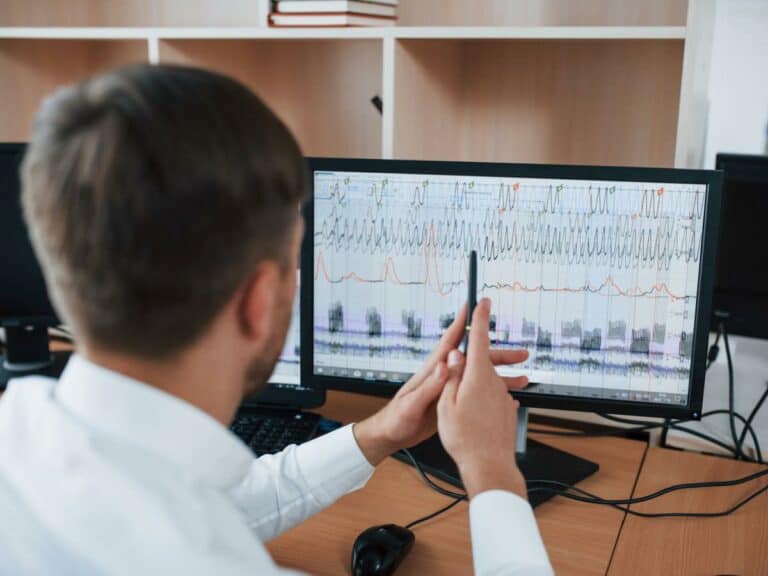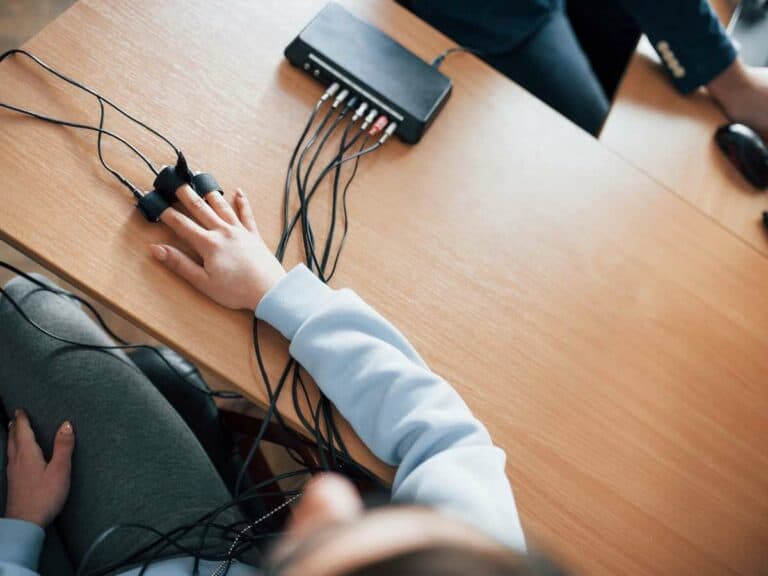How To Clear Your Mind for a Polygraph Test
The thought of taking a polygraph test can be nerve-racking enough. Reading the written report containing the result of the polygraph examination afterward can be more terrifying, though. And your anxiety can easily go straight through the roof knowing that being nervous can in fact affect the test’s result.
Freeing the mind of negative and intrusive thoughts about a polygraph test and its result is best done not only during the exam but also before it. Relaxing a day before and on the day of the scheduled test can help fend off unnecessary stress and anxiety that can affect the result of the lie detector exam.
Don’t stop reading now if you’re a nervous wreck because of an upcoming polygraph test.
Read Also: Can an Innocent Person Fail a Lie Detector Test?
In this post, you will come across some undeniably effective yet surprisingly easy ways to clear your mind before and during your lie detector test. You might even find them handy not only for beating polygraph-induced stress and anxiety but also for dealing with many other difficult and uncomfortable circumstances that can leave your mind in shambles.
The Day Before the Polygraph Test

Research, research, research
It’s normal for people to fear the unknown. And not having any prior experience with taking a lie detector test and not knowing anything about the truth-telling procedure can certainly make it scarier.
And then there’s the fact that even truthful examinees can sometimes be reported as being deceitful.
Prior to being hooked to a lie detector test, it’s a good idea to get yourself acquainted with the examination as well as the instrument used as much as you possibly can. How does a lie detector machine work? What’s the test like? What sort of questions are asked by the examiner? How long does the entire exam take to complete?
While it’s true that the polygraph examiner will familiarize you with the procedure during the pre-test phase, it pays to be armed with pertinent information before you head to the testing center.
You will feel less anxious about taking a lie detector test if you have more answers than questions.
Know why you are taking the examination
Want to clear your name? Want to land your dream job?
No matter the reason for the lie detector test, always keep your eyes on the prize: passing the examination. And unless you are planning on beating it by using countermeasures because your hands are dirty and you don’t want anybody to know about it, one of the best ways to ace a polygraph test is by telling nothing but the truth.
But whether you don’t have anything to hide or you believe that you are perfect for the job, then rest assured that there’s nothing for you to fear about a lie detector test.
Besides, a polygraph is voluntary — you will be subjected to it only if you agree to undergo it. Otherwise, no one can force you to have one. But it’s important to keep in mind that if a lie detector test will be used for pre-employment screening purposes, refusing to take it will leave the employer with no other choice but to consider hiring someone else.
Engage in de-stressing and relaxing activities
Just about any mental or physical activity that you enjoy doing can help lower your stress or anxiety levels, which can be extremely advantageous if you are about to take a polygraph examination anytime soon.
Hitting the gym, listening to music, painting a picture, writing in a journal, baking a cake, hanging out with friends, watching hilarious TV shows or movies — these are just some stress-busting activities that work wonderfully for some. Others find visiting a day spa to have a facial or a massage or connecting with nature effective.
On the internet, there are tons of meditation guides and tutorials available for beginners — watching and following them can come in handy not only before a lie detector exam but also during any other stressful moment.
No matter your preferred relaxing activity, remember to fully immerse yourself in it.
Forget about the polygraph test
Earlier, I talked about the importance of researching a polygraph test. While doing your homework, chances are that you will come across surprising pieces of information such as a polygraph is not entirely infallible, it has no admissibility in most states or jurisdictions, you can ask to retake the exam if you fail it and no one can force you to undergo it.
And then there’s also the fact that a lie detector test does not detect lies but stress and anxiety.
Knowing that the examination is not the ultimate deception spotter on the face of the planet can keep you from thinking that being subjected to it is some sort of a death sentence.
Besides, while all sorts of sensors are attached to your body, you will have nothing to do but answer either a yes or no — all questions during a lie detector test are the yes-or-no kinds. With only a couple of answers to choose from, a polygraph exam is probably one of the easiest tests you can take in this lifetime.
Get a good night’s sleep
There are a couple of reasons why sleep deprivation and a lie detector test do not mix. First, not getting enough Z’s can increase your stress levels the following day. Second, a lack of shut-eye can cause cognitive impairment.
Being relaxed and having a clear mind — these are important for any polygraph examinee to have.
Not thinking about the exam can help you fall asleep without any trouble the night before. But if that proves to be easier said than done, consider reading a boring book, enjoying a light snack or listening to nature sounds online at bedtime. Refrain from forcing yourself to get to dreamland without any delay as it will only leave you more wide awake.
While it’s perfectly fine to take a sleeping pill in order to enjoy 7 to 9 hours of sleep, refrain from having one just before you undergo your lie detector test. If the polygraph examiner notices that you are drowsy, he or she will refuse to conduct the test because it will only invalidate the result.
On the Day of the Polygraph Test
Maintain a normal routine
Whether it’s for employment purposes or a criminal investigation, undergoing a lie detector test is indeed a critical moment in your life. But it doesn’t mean that you should stop your life for it.
Since the goal is to feel calm, you should treat the day of the exam as a normal day.
This means that you should stick to your normal routine on the day of your polygraph examination. If you are used to starting your day with a cup of piping hot coffee, for instance, go ahead and enjoy your favorite brew. Or if you are told by your doctor to take your prescription drugs daily, feel free to pop those pills in your mouth.
According to a report by Verywell Mind, routines can help you manage stress and anxiety better. On the other hand, a lack of structure can worsen feelings of distress.
The goal is to make the day of your lie detector test feel like it’s just another day in your life.
Wear the right clothes
They always say that clothes make the man. When it comes to taking a lie detector test, the clothes you wear to it can spell the difference between passing and failing the examination.
One of the secrets to passing a polygraph exam is to feel relaxed and comfortable.
Nothing can make you feel uncomfortable while strapped to a polygraph machine more than a tight outfit that can restrict your breathing or a skimpy garment that can chill you to the bone. But while it’s recommended to put on comfortable clothes, it’s also important to give the polygraph examiner the impression that you take the test seriously.
Avoid tube tops, tank tops, daisy dukes, gym shorts and flip-flops. If the lie detector test is a pre-employment screening process and will be conducted in the workplace, needless to say, dress appropriately.
It’s also important to bear in mind that all polygraph sensors will be placed outside of the clothes you wear.
Acclimate to the testing center
Lie detector test exam rooms can come in all shapes and sizes. Some may be the size of an average corporate office, while others may look more like a small room. Some may be adorned with all sorts of framed awards, certificates and diplomas, while others may have minimal furnishing.
Regardless of the appearance of the room, it should not affect your confidence in the examination.
Step foot into the room, look around briefly and sit down. For the next 2 to 3 hours, you will be sharing the room with the polygraph examiner and, in some instances, a trainee gearing up to become a lie detector professional.
During the pre-test phase, which is the initial part of any polygraph, the administrator of the test will inform you that the entire examination will be recorded visually and aurally. Don’t be surprised — chances are that the recording started as soon as you entered the exam room.
And just a quick piece of advice: get to the testing center on or ahead of time.
Meet the polygraph examiner
Forensics crime drama TV shows and movies often depict people conducting lie detector tests as stern and cold criminal investigators, which is what gives many the impression that taking a polygraph examination can be a traumatizing experience. Well, if truth be told, your polygraph examiner could look like one.
But he or she could also look friendly or shy or don’t know a thing about polygraphy.
In any case, don’t let the appearance of an examiner change your opinion about the test or doubt the accuracy of the result. As they say, don’t judge a book by its cover.
Your polygraph examiner will do his or her best in order to make you feel relaxed and comfortable by getting you acquainted with the lie detector instrument and the test itself. And if you have questions about the examination, don’t feel too embarrassed to ask the person who will administer it shortly.
During the Polygraph Test
Let yourself be nervous
According to an associate professor of psychology at Harvard Medical School, wanting to get rid of anxiety can in fact make you feel even more anxious. He explains that worrying about eliminating your anxiety can activate your nervous system, which can cause your anxiety to end up worse than before.
An effective way to make anxiety go away is by accepting it and allowing it to run its course.
Whether innocent or guilty, it’s normal for a person to feel anxious about taking a lie detector test. The same is true if it’s for screening for a dream job since, after all, it’s one’s future career that’s on the line.
It’s also perfectly fine to tell the polygraph examiner that you are nervous. This will allow him or her to establish your baseline readings more accurately. Allowing the examiner to know that you are anxious not because you are trying to hide something but because of the test itself can help you calm down.
Build rapport with the polygraph examiner
The individual who is conducting the lie detector test isn’t your friend. He or she isn’t your enemy either — it’s just that the person is doing his or her job and questioning you is just all in a day’s work.
However, while you’re undergoing the examination, the examiner is someone you should connect with.
Different polygraph examiners have different ways of building rapport with the subjects of a lie detector test. It’s not unlikely for some of them to share stories or even joke that the test is no big deal. You will have an idea of the personality of the examiner during the pre-test phase, which will take up much of the examination’s time.
No matter if the examiner is friendly or otherwise, always keep in mind that you will be out of the testing center in 2 to 3 hours, which means that it’s pointless to stress over a person whom you might never ever see again.
Ask to have the question repeated if necessary
Several different questions will be asked by the polygraph examiner throughout the test. Some of them are relevant questions, which are crime-related. Others are control questions, which, although not directly related to the crime being investigated or job position available, can be uncomfortable to answer.
And then there are also irrelevant questions that provoke no emotion or the need to lie.
Regardless of the question, it’s perfectly fine to request the examiner to repeat it. As a matter of fact, in some instances, the examinee is allowed up to 6 times to ask to have the question repeated. But this is rarely needed because it’s not uncommon for the examiner to state a question 3 times.
Knowing that you heard or understood the question perfectly fine can help lower your anxiety. It’s also a good idea to take your time when answering a question.
Do box breathing
Taking slow, deep breaths activates the parasympathetic nervous system, which then calms the body’s fight or flight response — having the fight or flight response activated can mess with the polygraph.
Here’s a secret: before military individuals enter high-pressure situations, they do what’s referred to as box breathing. Also sometimes known as the Navy SEAL breathing technique or four-square breathing, it’s a deep breathing technique that helps to slow down breathing and, more importantly, calm the nerves.
Besides being effective, another nice thing about box breathing is that it’s so simple and easy to do.
Breathe in counting to 4, hold your breath for 4 seconds, breathe out counting to 4, count for 4 seconds before breathing in again — that’s how you do box breathing. And since it requires you to count in your mind every step of the way, you get distracted, too, which helps get your mind off being anxious.
Daydream about something comforting
What’s your happy place?
This is a question you may ask yourself before the polygraph examiner starts to throw yes or no questions your way. Having a clear picture of a place that makes you feel happy, relaxed and confident can help you calm down during a polygraph examination, thus keeping it from being a horrible experience and preventing a false positive result.
No matter if it’s a secluded beach, a cozy café or your bedroom you consider your happy place, imagining yourself in it instead of being in a room with a polygraph examiner and a lie detector machine can lower your blood pressure, slow down your heart rate and decrease your respiratory rate.
Read Also: Can a Heart Condition Affect a Polygraph?
But don’t get too lost in that place that brings you joy and peace of mind — it’s still important to pay attention to the polygraph examiner so that you can understand each question very well and answer it truthfully.
Just Before You Panic About Taking a Polygraph Test
One of the best things that you can do to increase your chances of passing that upcoming lie detector test is to put your stress and anxiety in check. While it’s perfectly normal to feel nervous about undergoing the examination, you should not let your nerves take control and influence your performance and, ultimately, the result.
Read Next: What to Expect on Polygraph






